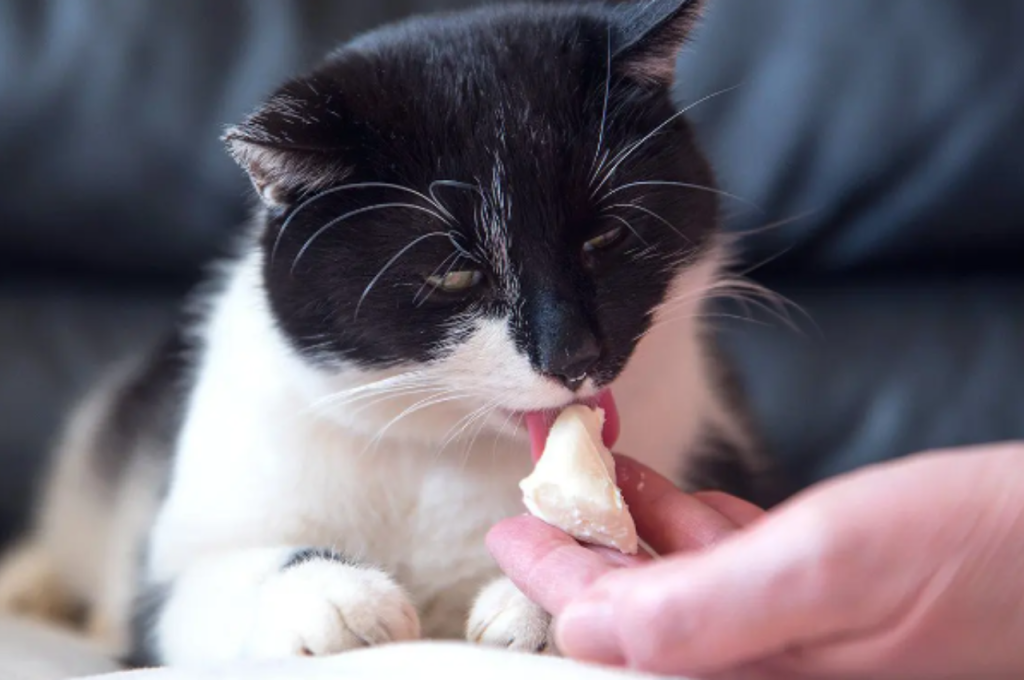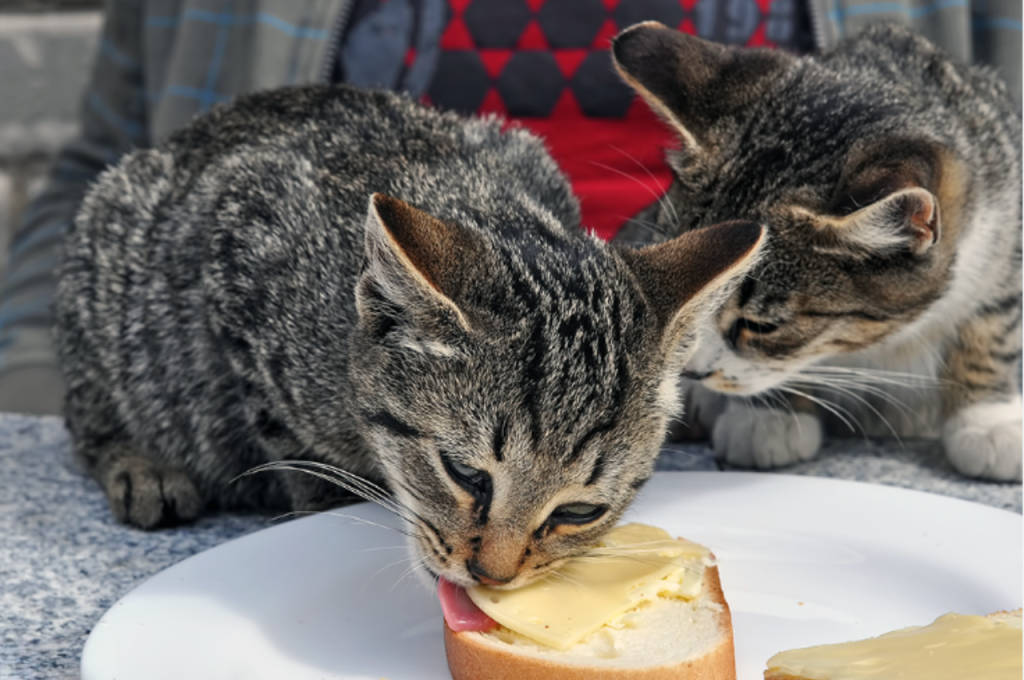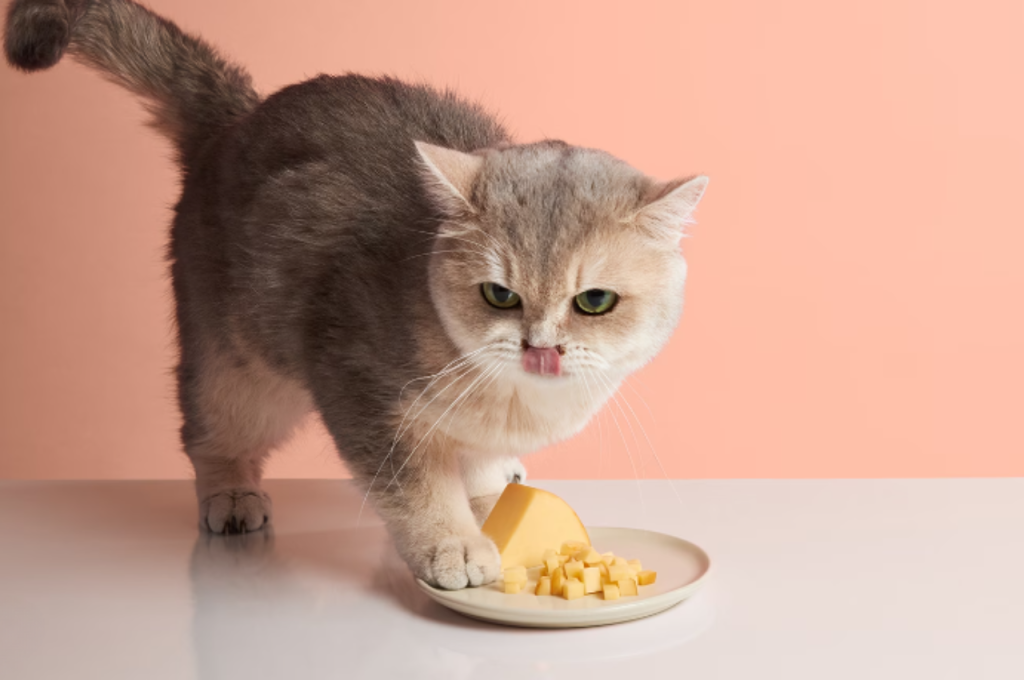Yes, cats can eat cheese, but it should be given in moderation. Some cats may be lactose intolerant, so it’s best to monitor their reaction.
Cheese can be a good source of protein and calcium for cats, but it should not replace their regular balanced diet. Introducing new foods to your cat’s diet should be done gradually to avoid any digestive issues. Always consult with your veterinarian before making any significant changes to your cat’s diet. Remember, every cat is different, so what works for one may not work for another.
Cats and Cheese: a Curious Combination
While small amounts of cheese aren’t toxic to cats, it’s not an ideal treat. Many cats are lactose intolerant, which means dairy products like cheese can cause digestive issues such as diarrhea or upset stomach. If you choose to give your cat cheese, opt for low-lactose varieties and only offer it occasionally in tiny amounts. Always observe your cat for any adverse reactions. It’s best to stick to cat-specific treats and foods that meet their nutritional needs to ensure they stay healthy and happy.

Cats’ Lactose Intolerance
Cats lack the enzymes needed to digest lactose properly. Cheese can cause stomach upset in cats. Feeding cheese in small amounts may be tolerable for some cats, but it’s best to avoid it.
Cheese As a Cat Treat
Cheese can be used as an occasional treat for cats. Monitor for any signs of digestive issues. Avoid giving cheese to lactose-intolerant cats. Opt for cat-safe treats instead.
Nutritional Impact of Cheese on Cats
Cheese is a popular food item enjoyed by humans worldwide, but can our feline friends partake in this indulgence as well? As cat owners, it’s essential to consider the nutritional impact of cheese on our pets. While cats are obligate carnivores and their dietary needs primarily consist of meat, a small amount of cheese can be given as an occasional treat. However, it’s crucial to understand the protein and fat content of cheese and be aware of potential health concerns that may arise.
Protein and Fat Content
Cheese is known for its high protein content, which is an essential nutrient for cats. Protein plays a vital role in the overall growth, maintenance, and repair of tissues. However, it’s important to note that cheese should not serve as a primary source of protein in a cat’s diet. Instead, it can be offered as a supplementary treat due to its palatability.
The fat content of cheese can vary depending on the type. Some cheeses, such as cheddar or mozzarella, may have higher fat content compared to others. While cats require a certain amount of fat in their diet for energy and the absorption of fat-soluble vitamins, excessive fat consumption can lead to weight gain and other health issues. Therefore, it’s advisable to offer cheese in moderation to avoid an imbalance in their diet.
Potential Health Concerns
While small amounts of cheese can be safe for cats, it’s essential to be aware of potential health concerns that may arise. Some cats may be lactose intolerant, meaning they lack the necessary enzymes to digest lactose, the sugar found in milk products. Feeding cheese to lactose-intolerant cats can lead to digestive upset, including diarrhea and stomach discomfort. Additionally, certain types of cheese, such as those with added ingredients like garlic or onions, can be toxic to cats. These ingredients can cause damage to their red blood cells, leading to anemia. It’s crucial to avoid feeding cats cheese that contains any harmful additives or ingredients.
While cheese can be offered as an occasional treat for cats, it should not replace their primary diet. It’s important to consider the protein and fat content of cheese, as well as any potential health concerns that may arise. As responsible cat owners, we should prioritize a balanced and species-appropriate diet for our feline companions.
Types of Cheese: Safe and Unsafe Options
Cheese can be a tasty treat for cats, but not all types of cheese are safe for them to eat. Some cheeses, like cheddar and Swiss, are generally safe in small amounts, while others, like blue cheese and feta, can be dangerous due to their high levels of sodium and fat. Cheese is a popular treat for many people, and it’s natural to wonder whether our feline friends can enjoy it too. However, not all types of cheese are safe for cats to consume. Let’s take a closer look at the different types of cheese and which ones are safe for our beloved pets.
Hard Vs. Soft Cheese
When it comes to cheese, the texture plays a crucial role in determining its safety for cats. Hard cheeses such as cheddar, Swiss, and Parmesan tend to have lower lactose content, making them easier for cats to digest. On the other hand, soft cheeses like Brie, Camembert, and cream cheese contain higher levels of lactose, which may cause digestive issues in cats.
Flavored Cheese Risks
While plain cheese in moderation may be safe for cats, it’s important to be cautious when it comes to flavored cheeses. Certain flavorings, such as garlic and onion, can be harmful to cats. These ingredients are commonly found in flavored cheeses and should be avoided to prevent potential health issues in felines. When offering cheese to your cat, always ensure it is given in small quantities and as an occasional treat. It’s important to monitor your cat for any adverse reactions and consult with a veterinarian if you have any concerns about your cat’s dietary choices.
Portion Control: How Much Cheese Can Cats Have?
Cats can eat cheese, but it should be in moderation due to lactose intolerance. A small amount as an occasional treat is fine, but excessive consumption can lead to stomach upset. It’s best to consult with your vet before introducing cheese into your cat’s diet.

Recommended Serving Sizes
When it comes to feeding your feline friend cheese, portion control is key. While cats can enjoy the occasional cheese treat, it’s important to keep their serving sizes in check. A proper understanding of the recommended serving sizes will help you ensure that your cat gets the right amount of cheese without any negative effects on their health. When it comes to cheese, less is more for cats. The recommended serving size for cheese is no more than a tablespoon per serving. Keep in mind that this is just a treat and should not be a regular part of your cat’s diet.
Frequency of Cheese Treats
While cats can enjoy cheese in moderation, it’s important to be mindful of the frequency of these treats. Too much cheese can lead to digestive issues, such as diarrhea or upset stomach. It’s best to offer cheese as an occasional treat rather than a daily indulgence. As a general guideline, limit cheese treats to once or twice a week. This will allow your cat to enjoy the flavors without overloading their system with too much dairy. Remember, moderation is key when it comes to treating your cat to cheese.
To summarize, when it comes to feeding your cat cheese, remember the importance of portion control. Stick to the recommended serving size of no more than a tablespoon and limit cheese treats to once or twice a week. By keeping these guidelines in mind, you can safely treat your feline friend to some cheesy goodness without any adverse effects on their health.
Alternatives to Cheese in A Cat’s Diet
Cheese may not be the best option for cats due to lactose intolerance. However, there are several alternatives to cheese that can be included in a cat’s diet, such as cooked chicken, fish, or commercially available cat treats made with real meat. These alternatives provide necessary nutrients without the potential digestive issues associated with cheese.
Alternatives to Cheese in a Cat’s Diet Cats may enjoy cheese, but it’s not the healthiest option for them due to lactose intolerance. Healthy snack ideas for cats can include cooked eggs, small amounts of cooked fish, or plain cooked chicken. Commercial cat treats are also popular alternatives that are specifically formulated for feline nutrition.
Healthy Snack Ideas
- Cooked eggs
- Small amounts of cooked fish
- Plain cooked chicken
Commercial Cat Treats
- Formulated for feline nutrition
- Provide essential nutrients
- Available in various flavors and textures
Understanding Cats’ Dietary Needs
Cats can eat cheese, but it should be given in moderation due to their lactose intolerance. While some cats may tolerate it well, others could experience digestive issues. It’s best to offer cheese as an occasional treat rather than a regular part of their diet.
As a cat owner, you may be wondering if it’s safe to feed your feline friend some cheese. While cheese is a tasty treat for humans, it may not necessarily be suitable for cats. Understanding your cat’s dietary needs is essential to keep them healthy and happy. This article will discuss the essential nutrients cats need, the risks of a human food diet, and whether cheese is safe for cats to consume.
Essential Nutrients for Cats
Cats have unique dietary needs that differ from humans and other animals. They are obligate carnivores, meaning they require a diet rich in animal protein to survive. Essential nutrients such as taurine, arginine, and arachidonic acid are necessary for maintaining healthy eyesight, heart function, and skin and coat health. Therefore, it’s crucial to feed your cat a diet that consists of high-quality protein sources, such as meat, fish, and poultry.
Risks of a Human Food Diet
Feeding your cat a diet rich in human food can be dangerous and even fatal. Foods such as onions, garlic, chocolate, and caffeine can be toxic to cats and cause severe health problems. Moreover, human food diets are often deficient in essential nutrients that cats require, leading to malnutrition and other health issues. Therefore, it’s best to stick to a balanced diet that meets your cat’s nutritional needs. While cheese may seem like a harmless treat, it’s not necessarily safe for your cat to consume. Cheese is high in fat and lactose, which can cause digestive issues such as diarrhea and vomiting.
Additionally, some cats may be lactose intolerant, making it difficult for them to digest dairy products. Therefore, it’s best to avoid feeding cheese to your cat and stick to a diet that meets their unique nutritional needs. In conclusion, understanding your cat’s dietary needs is crucial to their overall health and well-being. Feeding your cat a diet that meets their nutritional requirements and avoiding human foods that may be toxic or harmful is essential. While cheese may seem like a tasty treat, it’s not necessarily suitable for cats and can cause digestive issues.
Therefore, always consult with your veterinarian before making any dietary changes for your feline friend.
Recognizing Allergic Reactions to Dairy
Recognizing allergic reactions to dairy in cats is essential. While some cats may tolerate small amounts of cheese without any issues, others may experience allergic reactions such as vomiting, diarrhea, or skin irritations. It’s important to monitor your cat’s response to cheese and consult with a veterinarian if any adverse reactions occur.
Symptoms of Dairy Allergies
When it comes to dairy, cats can be quite sensitive. Recognizing the symptoms of dairy allergies is crucial for ensuring your feline friend’s well-being. Common symptoms of dairy allergies in cats include vomiting, diarrhea, skin rashes, and itching. Additionally, you may notice your cat experiencing respiratory issues or showing signs of distress. These symptoms can manifest shortly after consuming dairy products.
Immediate Steps and Veterinary Care
If you observe any of these symptoms in your cat after they have consumed cheese or any other dairy product, it’s essential to take immediate action. First, remove the dairy product from your cat’s access. Ensure your cat has access to fresh water. Monitor your cat closely for any signs of distress or worsening symptoms. If the symptoms persist or worsen, it’s crucial to seek veterinary care promptly. In addition to removing the dairy products from your cat’s diet, providing a comfortable and stress-free environment can help alleviate any distress your cat may be experiencing. If the symptoms do not improve or if you notice any concerning developments, contact your veterinarian for further guidance and potential treatment options.
Remember, every cat is unique, and while some may tolerate dairy products without any issues, others may experience severe allergic reactions. Understanding the signs of dairy allergies and taking prompt action is key to ensuring the health and well-being of your feline companion.
Expert Opinions on Felines and Dairy Products
Expert opinions on felines and dairy products are varied, with the question of whether cats can eat cheese sparking much debate. Let’s delve into the insights provided by veterinarians and nutritional research findings to gain a better understanding of this topic.

Veterinarian Recommendations
Veterinarians generally advise against feeding cheese to cats. While some cats may tolerate dairy products, many are lactose intolerant, making cheese a potentially upsetting and harmful choice for feline consumption.
Nutritional Research Findings
Nutritional research indicates that cheese is high in fat and protein, which can be difficult for cats to digest. Furthermore, the lactose content in cheese can lead to gastrointestinal discomfort and digestive issues in many felines. It is best to provide cats with a balanced diet that meets their specific nutritional needs, without relying on dairy products.
Conclusion
Cats can eat cheese in moderation but not all cats tolerate dairy well. Always monitor for any adverse reactions when feeding your feline friend cheese. Remember, a balanced diet is key to keeping your cat healthy and happy. Enjoy sharing occasional cheesy treats with your furry companion.
